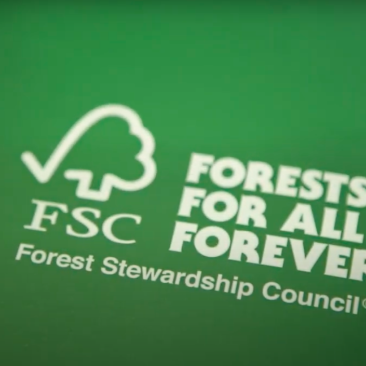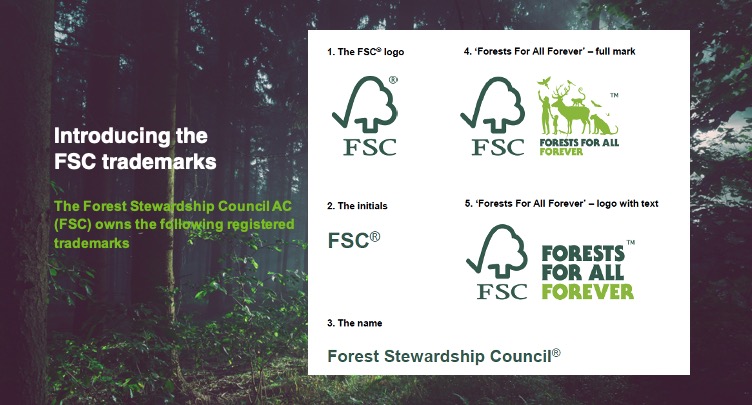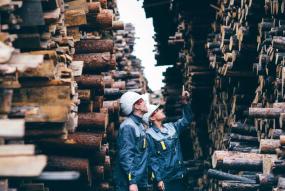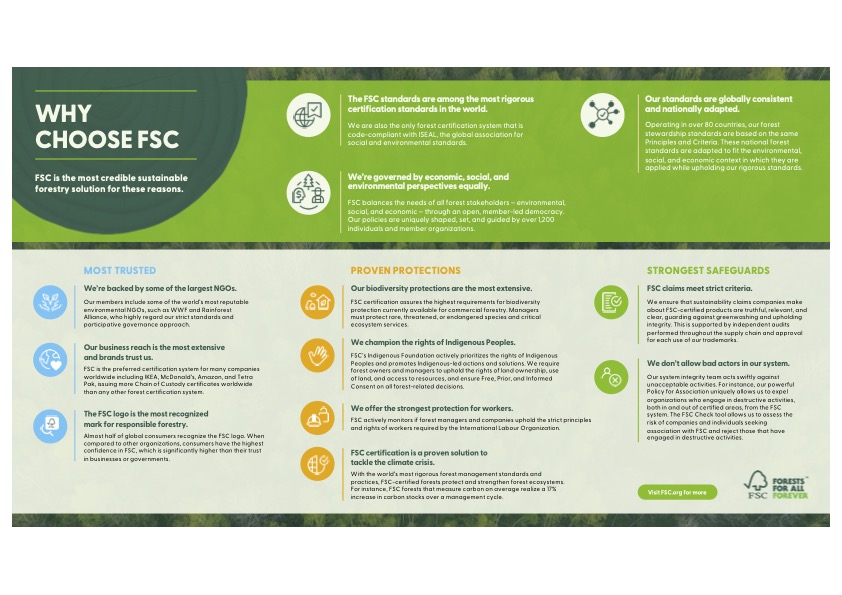
Demonstrate Value and Benefits of Forest Stewardship
Sustainable forest management practices result in forest operations that are structured and managed to be sufficiently profitable, but not at the expense of forest resources, the ecosystem, or local communities. Managing forests sustainably improves forest resilience, enhancing its critical role in climate change mitigation and adaptation, as well as protecting important ecosystems and biodiversity – setting us on the path towards a low-carbon, sustainable, resilient economy, and society.
The world’s forests must be treasured for the value and benefits they provide.
They are vital ecosystems housing most of the world’s terrestrial biodiversity, they are the life-support systems for hundreds of millions of Indigenous Peoples and local communities, and they are a crucial basis for the necessary shift to bio-based and low-carbon circular economies.

The Forest Stewardship Council® (FSC®)
FSC is an international, non-profit, non-governmental organisation (NGOs) dedicated to promoting environmentally appropriate, socially beneficial and economically viable management of the world’s forests. Since its foundation in 1994, FSC has grown to become the world’s most respected and widespread forest certification system trusted by consumers, businesses, environmental groups and NGOs.
FSC's pioneering certification system, which now covers more than 200 million hectares of forest, enables businesses and consumers to choose wood, paper and other forest products made with materials that support responsible forestry.

Our System and Approach
-
FSC Principles and Criteria
Resilient forests embody the true economic, social and environmental value of forests. This value is holistic and evolves over time. For FSC, true value is captured in forests managed in accordance with FSC Principles & Criteria (P&C) for Forest Stewardship.
-
Accreditation and System for Independent Certification
FSC provides a system for voluntary accreditation and independent third-party certification. This system for certification allows certificate holders to market their products and services as the result of environmentally appropriate, socially beneficial and economically viable forest management.
-
The World’s Most Trusted Sustainable Forest Management Solution
FSC forest management (FM) certification confirms that the forest is being managed in a way that preserves biological diversity and benefits the lives of local people and workers, while ensuring it sustains economic viability. FSC-certified forests are managed to strict environmental, social and economic standards.
With support from experts in the environmental, economic and social spheres, FSC developed ten principles that any forest operation must adhere to before it can receive FSC forest management certification. These requirements ensure that the forest is being managed in a way that preserves biological diversity, upholds Indigenous Peoples’ rights, benefits the lives of local people and workers, and is economically viable.
-
Supply Chain Integrity
From forest to store, we are committed to ensuring credible, accurate and transparent supply chains. FSC chain of custody (COC) certification verifies that FSC-certified material has been identified and separated from non-certified and uncontrolled material as it makes its way along the supply chain.
Any company involved in the processing or transformation of FSC-certified products (e.g. manufacturing, repackaging, pack-splitting, relabelling, cutting to size or adding other forest-based components to the product) must be FSC-certified in order to apply an FSC label to their products and/or sell them with an FSC claim.
As COC certification evolves, FSC is steadfastly committed to ensuring the ongoing integrity of supply chains.
-
Trademarks and Labels
The Forest Stewardship Council AC owns five registered trademarks:

FSC's ‘check-tree’ or ‘tick-tree’ logo (a key part of the FSC labels), which can be found on millions of products and items of packaging around the world, provides an assurance that the wood, paper and other forest-based products you purchase come from responsible sources and have been verified to meet FSC’s strict environmental and social standards.
The FSC trademarks can be used by FSC certificate holders and FSC promotional licence holders. They can also be used for educational and research purposes and by the media.
-
FSC’s Core Strength: Co-creation of Solutions
Unique Governance Structure and Global Network
Anchored in membership engagement and a global network of partners, FSC convenes members and other partners from diverse interests to set global benchmarks for forest stewardship and deliver significant results for the forests and the people who depend on them, in finding solutions that deliver change on the ground.

FSC’s unique governance structure ensures that all voices are heard and that decisions are made through consensus.
-
We are FSC
FSC is a global network of members, staff, certificate holders, promotional licence holders and responsible consumers. By working together we can help to ensure that we use forests and forest products responsibly, shifting the global forest trend towards sustainable use, conservation, restoration, and respect for all.
FSC for Business
Forest Management Certification
As a forest manager or owner, FSC certification is a way of ensuring that your careful and long-term stewardship is recognised, and tested against nationally and internationally agreed agreed standards of...

Chain of Custody Certification
When it comes to forest-based products, FSC certification is the sustainable choice you can trust to deliver better outcomes for forests, people and markets – today and for future generations.

Promotional Licence
If you buy FSC-labelled products from an FSC-certified supplier and either use them in your business (e.g. paper-based packaging, toilet rolls, office paper) or sell them on, unchanged, to the public, a...
According to the Intergovernmental Panel on Climate Change (IPCC*) Assessment Report 4:
"Sustainable forest management of both natural and planted forests is essential to achieving sustainable development. It is a means to reduce poverty, reduce deforestation, halt the loss of forest biodiversity, and reduce land and resource degradation, and contribution to climate change mitigation.
Forests play an important role in stabilisation of greenhouse gas concentrations in the atmosphere while promoting sustainable development (Article 2; Kyoto Protocol). Thus, forests have to be seen in the framework of the multiple dimensions of sustainable development, if the positive co-benefits from forestry mitigation activities have to be maximised. Important environmental, social, and economic ancillary benefits can be gained by considering forestry mitigation options as an element of the broader land management plans."
"In the long term, sustainable forest management strategy aimed at maintaining or increasing forest carbon stocks, while producing an annual yield of timber, fibre, or energy from the forest, will generate the largest sustained mitigation benefit."
*IPCC is the United Nations body for assessing the science related to climate change.

